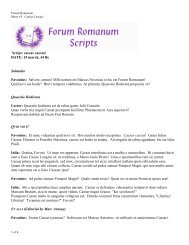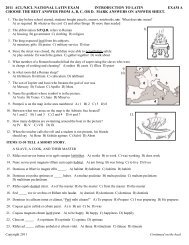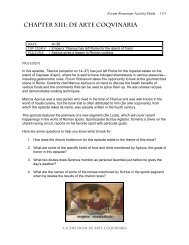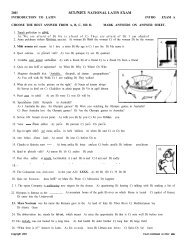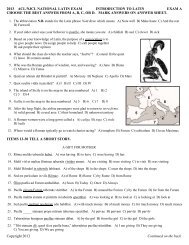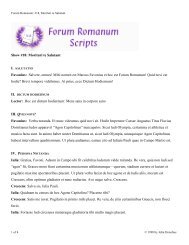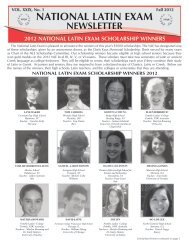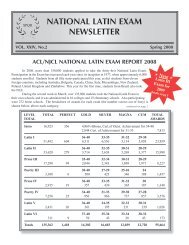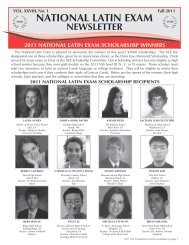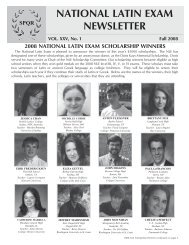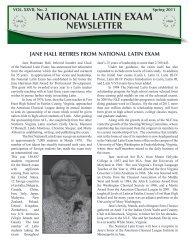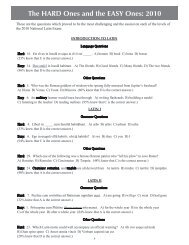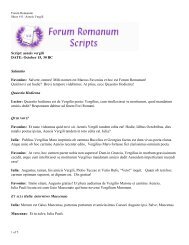2009 acl/njcl national latin exam introduction to latin intro exam a ...
2009 acl/njcl national latin exam introduction to latin intro exam a ...
2009 acl/njcl national latin exam introduction to latin intro exam a ...
You also want an ePaper? Increase the reach of your titles
YUMPU automatically turns print PDFs into web optimized ePapers that Google loves.
23. Agricola canem vocat quod tempus fugit. A) although B) because C) and D) where<br />
24. “Ego tē exspectābam,” agricola dīcit. A) am waiting for B) wait for C) was waiting for D) will wait for<br />
25. “Ubi erās tū?” agricola rogat. A) Why B) What C) Where D) How long<br />
26. “Cūr tū in vīllā nōn manēs?” agricola rogat. A) we B) you C) I D) they<br />
27. “Nunc, sedē!” agricola dīcit. A) I am sitting B) sit C) we will sit D) we were sitting<br />
28. “Sed tū _____ bonus canis!” agricola canem laudat. A) sum B) es C) est D) sunt<br />
29. “Ego _____ cēnam tibi parābō.” A) optimās B) optimōs C) optimam D) optimum<br />
30. “Tum nōs stellās spectābimus.” A) we watch B) we are watching C) we were watching D) we will watch<br />
READ THE REST OF THE STORY AND ANSWER THE QUESTIONS.<br />
THE LADY AND THE HORSE<br />
Cotīdiē fēmina in viā per silvam ambulat. Per agrōs 1 Cotīdiē = Every day<br />
ad agricolae vīllam ambulat. Fēmina agricolae duōs nummōs 2 nummōs = coins<br />
dat et agricola fēminae decem māla dat. Ubi fēmina ad vīllam 3 māla = apples<br />
suam revenit, cantat. Cotīdiē equus fēminam audit et 4 suam = her; revenit = returns<br />
ad fēminam ambulat. Fēmina semper equō ūnum mālum dat. 5 mālum = apple<br />
Quondam lātrō fēminam et decem māla videt. Lātrō 6 Quondam = One day; lātrō = robber<br />
fēminam pulsat et in silvam trahit. Fēmina est exanimāta 7 trahit = drags; exanimāta = unconscious<br />
et lātrō decem māla capit. Tum fēmina sē recuperat. 8 capit = takes; sē recuperat = regains consciousness<br />
Est sōla. Clāmat sed nēmō respondet. Silva est obscūra. 9 sōla = alone; nēmō = no one; obscūra = dark<br />
Quod fēmina temptat esse placida, cantat. Equus 10 placida = calm<br />
fēminam audit et ad fēminam festīnat. Equus fēminam 11<br />
ē silvā portat. Nunc fēmina duo māla equō cotīdiē dat. 12<br />
31. In lines 2-3, we learn that the woman gets ten apples from A) two boys B) two apple trees C) a merchant<br />
D) a farmer<br />
32. Lines 3-4 indicate that on the way home the woman A) meets friends B) sings C) runs D) sells apples<br />
33. Line 5 shows the woman A) likes the horse B) fears the horse C) buys the horse D) avoids the horse<br />
34. In lines 4-5, the horse comes <strong>to</strong> the woman every day because she A) rides him B) feeds him C) waters him<br />
D) brushes him<br />
35. In lines 6-8, the robber gets the apples by A) stealing them when the woman is running<br />
B) tricking the woman C) attacking the woman D) praising the woman<br />
36. Where does the woman awake (lines 6-9)? A) in the road B) in a wagon C) by a stream D) in the forest<br />
37. In line 10, the woman tries <strong>to</strong> calm herself by A) counting sticks B) drinking some water<br />
C) making a campfire D) singing a song<br />
38. In lines 9-11, the only one <strong>to</strong> hear the woman is A) the horse B) the robber C) another woman D) the farmer<br />
39. In lines 10-11, the horse hurries <strong>to</strong> the woman because A) he is thirsty B) the farmer sends him<br />
C) the robber frightens him away D) he recognizes her voice<br />
40. Now the woman gives the horse two apples every day because the horse A) has been sick B) kicked the robber<br />
C) rescued her D) summoned the villagers<br />
Copyright <strong>2009</strong><br />
Copyright <strong>2009</strong>



